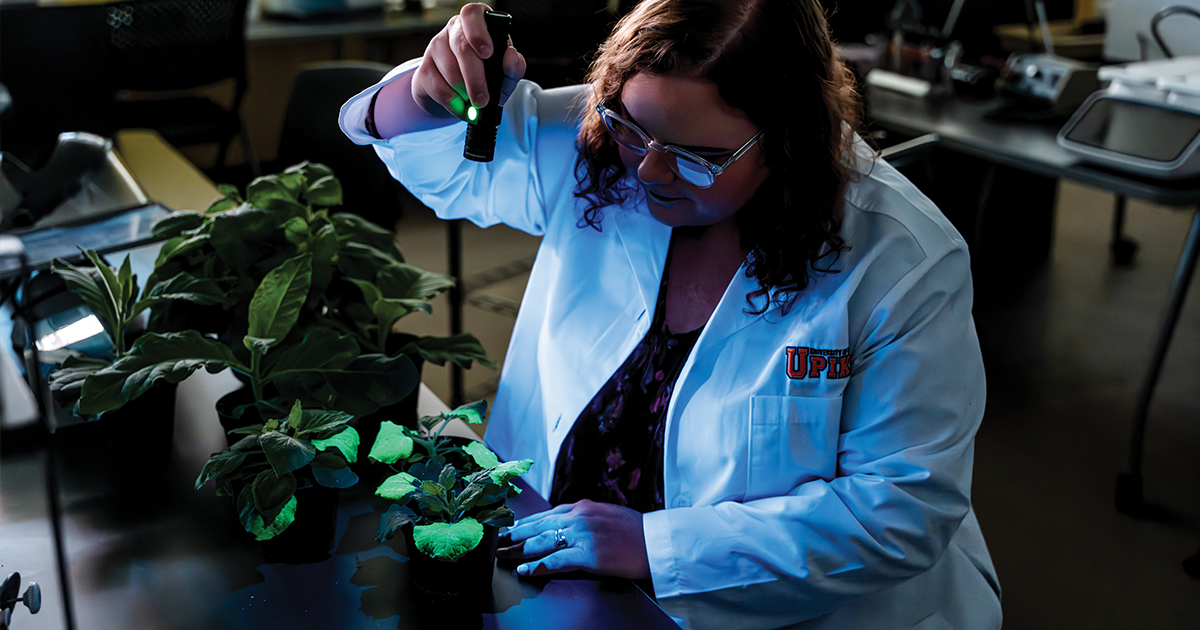
3 minute read
Turning Leaves Into Life-Saving Medicine
By AMY CHARLES, MBA ’23
The University of Pikeville is at the forefront of remarkable developments in biopharmaceuticals. Associate Professor of Molecular Biology Kevin Wang, Ph.D., is pioneering a project titled PlantDerived Recombinant Therapeutic Kallikrein for Disease Treatment, funded in 2024 by the Research Project Award from the Kentucky Institutional Development Award (IDeA) Networks of Biomedical Research Excellence (KY INBRE). Additionally, his initiative Embracing Plant Biotechnology in Undergraduate Biotechnology Research at UPIKE was recently awarded the Course-based Undergraduate Research Experiences (CURE) grant KY INBRE. Supported by the National Institutes of Health National Institute of General Medical Sciences, these grants have enabled UPIKE to launch a groundbreaking plant-based biopharmaceutical project, offering a new, sustainable alternative to traditional drug production methods.
The research being conducted at UPIKE could dramatically change the landscape of how life-saving medications are produced. For decades, the pharmaceutical industry has relied on costly animal cell cultures and bacterial fermentation to develop treatments for strokes, heart attacks, immune disorders and viral infections. Now, Wang and his students are investigating producing therapeutic proteins in plants, which is a more cost-effective and environmentally friendly approach.
“The potential of plant-based biopharmaceuticals is extensive,” said Wang. “Plants are nature’s best factories. What we are doing here could change how medicines are made and distributed, making them more affordable and accessible.”
The innovative process involves introducing a gene that codes for a specific therapeutic protein into a plant. In just four to seven days, the plant’s leaves begin producing the protein naturally. Once the protein is made, it is harvested and purified for medical use. This method is not only faster than traditional pharmaceutical production, which can take months, but it also holds great promise for reducing production costs significantly Wang describes Director of UPIKE’s Research and Entrepreneurship Incubator Eric Werth, Ed.D., as instrumental in advancing his research, dedicating much of his time and effort to supporting the students involved. KY INBRE mandates undergraduate student involvement in the lab, whereas similar research nationwide typically includes graduate or professional school students.
“While there are other universities conducting research that involves injecting proteins into plants, Dr. Wang’s research model is very efficient,” said Werth. “INBRE grants fund projects for undergraduate students, and we want more students exploring careers in biomedical science to gain experience in research before continuing into graduate or professional schools.”

Wang’s work is not only advancing scientific knowledge but also providing invaluable opportunities for students to engage in cutting-edge research. UPIKE’s research team won first place for Most Innovative Science Poster at the National IDeA Symposium of Biomedical Research Excellence in Washington, D.C. The poster, titled Efficient Production of Serine Proteases Using Plant Transient Expression Systems: A Sustainable Alternative to CHO Cell Cultures, was authored by nursing student Kylie Hall and co-authored by Savannah McKendree, Laikin Tackett and Russell Goins under Wang’s supervision.
“I am grateful for Dr. Wang and the way he puts students first. He has always made sure we are learning in the lab and out of it,” said Hall. “From being professional to cultural learning, he teaches us through experience and I will forever be thankful to God that he brought Dr. Wang to UPIKE.”











